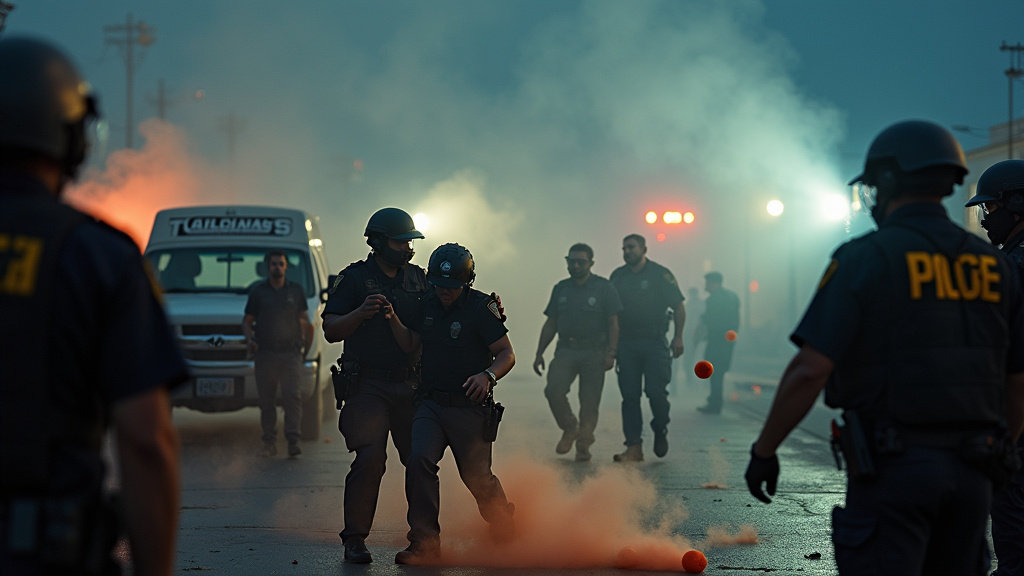CHICAGO, IL – October 6, 2025 – In a significant legal challenge, the states of Illinois and the city of Chicago have filed a lawsuit aiming to halt the Trump administration’s controversial plan to deploy hundreds of National Guard troops to the region as part of an escalating immigration crackdown.
This legal action, announced Monday, arrives as troops were preparing for deployment and just hours after a federal judge in Oregon issued a similar block on federal troop movements to Portland. The move by Illinois and Chicago underscores a growing conflict between the Trump administration and Democratic-led cities over the use of federal force amidst heightened immigration enforcement.
The lawsuit, filed in federal court, labels the impending deployment of both Illinois National Guard members and additional troops from Texas as “unlawful and dangerous.” Officials argue that the administration’s justification for sending troops, which has involved characterizing cities like Chicago as “war zones,” is a politically motivated federal overreach that threatens constitutional rights.
Legal Challenge Against Federal Authority
Illinois Governor JB Pritzker and Chicago Mayor Brandon Johnson spearheaded the legal fight, asserting that the federal government is exceeding its authority. The lawsuit contends that citizens should not live under the threat of military occupation simply because their local or state leadership is at odds with the President’s agenda. Governor Pritzker has sharply criticized the deployment, denouncing it as “Trump’s invasion” and an “outrageous and un-American” demand.
The administration, through White House spokesperson Abigail Jackson, stated that President Trump authorized the deployment citing “ongoing violent riots and lawlessness” that local leaders had allegedly failed to quell. Homeland Security Secretary Kristi Noem echoed this sentiment, defending the move on national television by calling Chicago a “war zone.”
However, Governor Pritzker refuted these claims, suggesting that the administration’s rhetoric aims to “create the war zone, so that they can send in even more troops.” The lawsuit further argues that the deployment violates the Posse Comitatus Act, a federal law that strictly limits the use of the military for domestic law enforcement purposes, unless specifically authorized by Congress or in cases of invasion or rebellion.
Context of Federal Actions and Protests
The legal battle unfolds against a backdrop of increased federal law enforcement activity in Chicago and its surrounding areas. For weeks, federal agents have been conducting arrests in neighborhoods with significant immigrant populations, sparking widespread protests and civil unrest.
A particularly contentious incident occurred recently when federal agents shot a woman on Chicago’s southwest side. The Department of Homeland Security (DHS) stated that their agents opened fire after their vehicles were rammed and surrounded by other cars, and one driver reportedly possessed a semi-automatic weapon. The woman, identified as Marimar Martinez, later faced federal charges for assaulting a federal officer.
Adding to the legal challenges, the ACLU of Illinois also filed a lawsuit, accusing federal agents of engaging in a “campaign of violence and intimidation” against peaceful protesters and journalists outside an ICE detention facility in Broadview, Illinois. The ACLU alleges that agents used tear gas, pepper balls, and other projectiles against demonstrators exercising their First Amendment rights.
The Portland Precedent and Broader Implications
This legal confrontation echoes similar actions taken in Portland, Oregon, where a federal judge, Karin Immergut, had previously blocked the Trump administration’s attempts to deploy National Guard troops. Judge Immergut ruled that the administration’s justifications for deployment were “simply untethered to the facts” and that the move constituted an overreach of presidential authority, stating, “This is a nation of constitutional law, not martial law.”
Illinois and Chicago are now joining California and Oregon in challenging the administration’s strategy of federalizing National Guard troops and deploying them into Democrat-led cities against the wishes of state and local officials. This trend raises significant questions about the balance of power between federal and state governments and the constitutional limits on using military forces for domestic law enforcement.
A recent CBS poll indicated that a majority of Americans, 58 percent, oppose the deployment of the National Guard to cities.
The lawsuit filed by Illinois and Chicago represents a significant legal battleground in the ongoing tensions between the federal government and local authorities over immigration policy and the administration’s use of federal power. The outcome is expected to have far-reaching implications for civil liberties and the relationship between state and federal governments in the United States, making this trending news a critical development.














